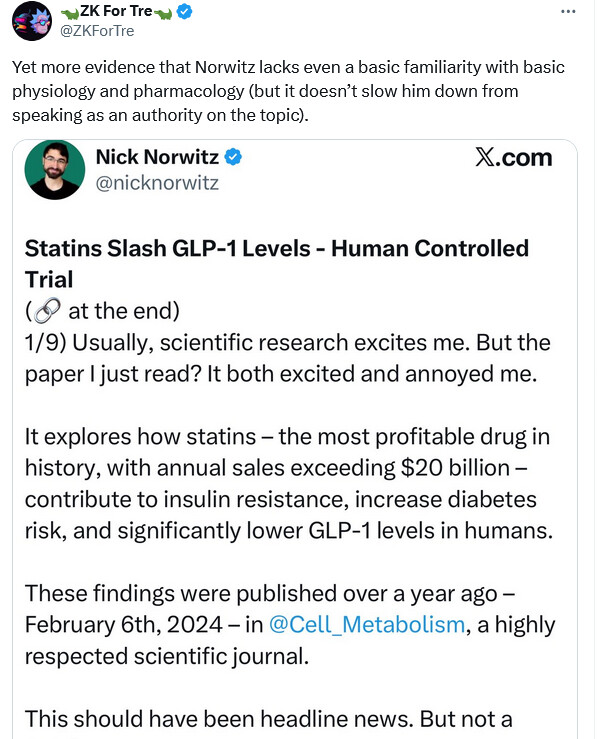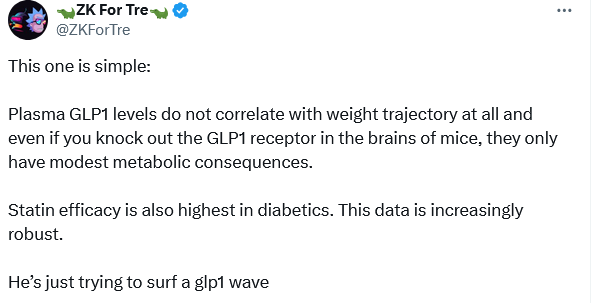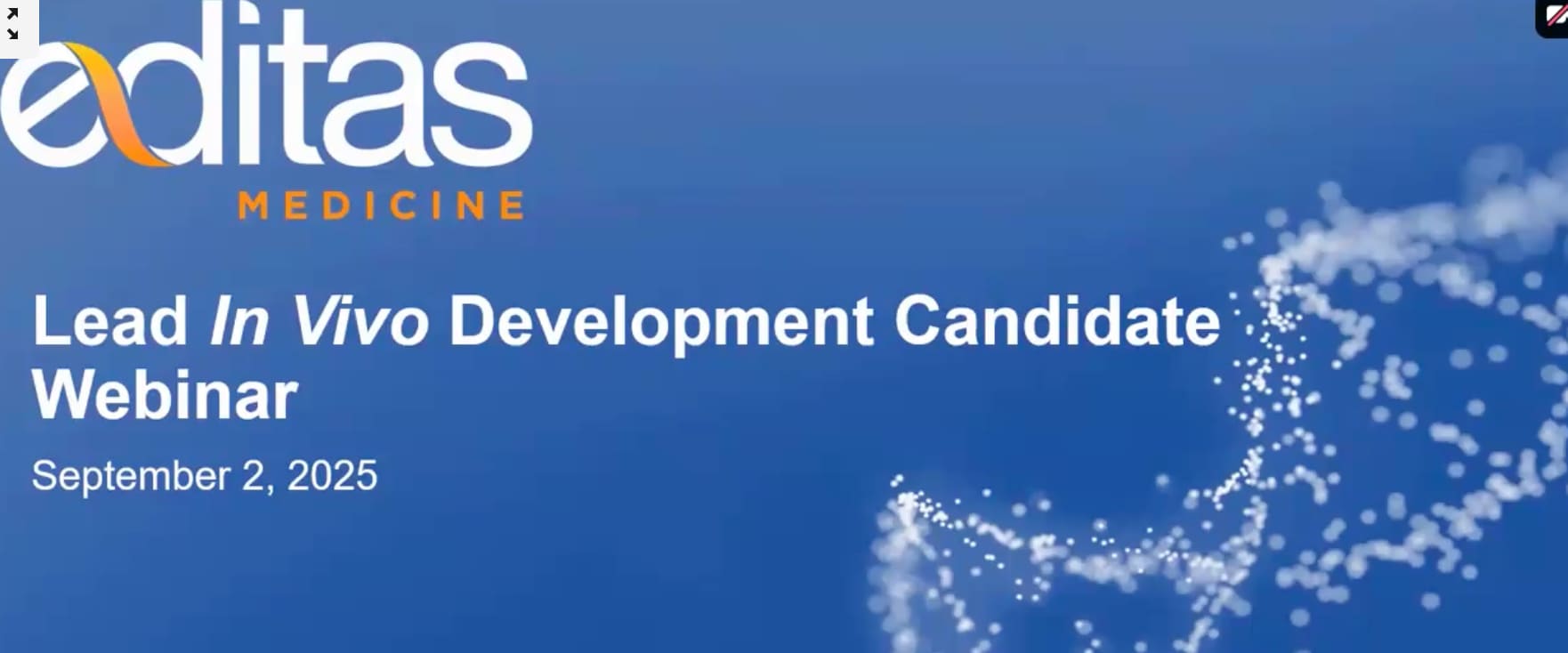Just as a little update, make sure to check a few posts earlier. If you look at Table 2 in the paper, there actually is a big decrease in MACE in the CAC = 0 group, once they adjusted for compliance. The other groups (CAC 1-100, 100+) didn’t change much.
IMO, what happened is, people got a CAC = 0, then they got a false sense of security, and they stopped taking the statins. Whereas people with positive scores are told “you have advanced CVD” and they were much more compliant.
So people like you and me, we fit into the category of being “at risk” but having CAC = 0. That group actually saw a big and significant reduction in MACE; aSHR 0.66, P = 0.0046.
So yeah, keep taking your statins!
IMO, the “debate” is pretty much pointless. It might be more of an academic point rather than something actionable by the population.
Maybe people find whatever niche cases of Eskimos eating whale blubber and being healthy, but that’s not the world we live in. Where we live, the sat fat we consume is mostly associated with highly-calorific, highly-processed food; deep fry, hot dogs, processed red meat etc. Nobody credible believes that high saturated fat intake inside of a western diet is good for you. People drinking pure coconut oil etc for health benefits are insane IMO.
At the same time, I think it’s fairly clear what a “healthy” or “unhealthy” diet is.
There are plenty of natural or unprocessed foods that are high in saturated fat. Those will increase LDL-C / apoB compared to PUFA and MUFA, and subsequently increase causal CVD risk and plaque compounding over time.
Does anyone have the full text?
Long-Term Cognitive Safety of Achieving Very Low LDL Cholesterol with Evolocumab
Hi @A_User, incase this is what you are looking for:
Long-Term Cognitive Safety of Achieving Very Low LDL Cholesterol with Evolocumab
Authors: André Zimerman, M.D., Ph.D., Michelle L. O’Donoghue, M.D., M.P.H., Xinhui Ran, M.S., KyungAhIm, Ph.D., Brian R. Ott, M.D., François Mach, M.D., Kenton Zavitz, Ph.D., +6 , and Robert P. Giugliano, M.D., S.M.Author Info & Affiliations
Published December 24, 2024
NEJM Evid 2025;4(1)
DOI: 10.1056/EVIDoa2400112
Abstract
BACKGROUND
Concerns persist regarding the cognitive safety of achieving very low levels of low-density lipoprotein (LDL) cholesterol. Although short-term studies are reassuring, the long-term cognitive effects of sustained exposure to very low LDL cholesterol levels through combined proprotein convertase subtilisin–kexin type 9 (PCSK9) inhibition and statin therapy remain unknown.
METHODS
This prospective study enrolled a subset of adults with atherosclerotic cardiovascular disease who had completed a neurocognitive substudy (EBBINGHAUS) of a placebo-controlled randomized trial of evolocumab (FOURIER) and were eligible for a long-term open-label extension. The objective of this current study was to assess the long-term effect of evolocumab on cognitive function. Cognitive function was assessed annually, and the primary end point was change from baseline in executive function within each group, measured using the spatial working memory strategy index score (range, 4–28), with lower scores indicating better performance.
RESULTS
A total of 473 patients out of the 1974 patients in the parent EBBINGHAUS study were enrolled and additionally followed for a median of 5.1 years (maximum follow-up since original random assignment 7.2 years). The median age was 62 years; 70% were male, and 91% were White. At 12 weeks into the open-label extension period, median LDL cholesterol across the overall population was 35 mg/dl (interquartile range, 21–55 mg/dl). Treatment with evolocumab was not associated with a change in executive function during the open-label extension in either patients who were originally randomly assigned to and continued evolocumab (mean±standard deviation of 0.1±2.8, P=0.49) or patients originally randomly assigned to placebo who then started on evolocumab (−0.1±2.5, P=0.64). At the final study visit, executive function scores were similar between randomly assigned groups (17.5±3.7 and 17.3±3.7, respectively).
CONCLUSIONS
Exposure to very low levels of LDL cholesterol, achieved via PCSK9 inhibition and statin therapy, was not associated with cognitive impairment through long-term follow-up. Further studies are needed to assess the generalizability to adults at higher risk of dementia.
A major international study found that even mild Covid infections can stiffen blood vessels as if they had aged five extra years, raising long-term risks of heart attacks and strokes.
Covid Infection May Accelerate Vascular Aging
A Covid infection may cause blood vessels to age by about five years, with the effect most pronounced in women, according to new research published in the European Heart Journal.[1]
Normally, arteries and veins stiffen gradually as part of the natural aging process. This study, however, suggests that Covid speeds up that change. Stiffer blood vessels are a concern because they raise the risk of cardiovascular problems, including stroke and heart attack.
The work was led by Professor Rosa Maria Bruno of Université Paris Cité in France. She explained: “Since the pandemic, we have learned that many people who have had Covid are left with symptoms that can last for months or even years. However, we are still learning what’s happening in the body to create these symptoms.
“We know that Covid can directly affect blood vessels. We believe that this may result in what we call early vascular aging, meaning that your blood vessels are older than your chronological age and you are more susceptible to heart disease. If that is happening, we need to identify who is at risk at an early stage to prevent heart attacks and strokes.”
Research Paper (open access):
Accelerated vascular ageing after COVID-19 infection: the CARTESIAN study
https://academic.oup.com/eurheartj/advance-article/doi/10.1093/eurheartj/ehaf430/8236450
New ~2 hour video by Simon Hill interviewing Dan Soffer and Dayspring about the best cholesterol-lowering therapies for lowering apoB & CVD risk:
Image unrelated
In working on my poster I looked at the question of covid damaging mitochondria and there is quite a bit of research on that which I have linked to in my poster (I have checked that the links work, but not reviewed the contents of the papers).
The table may be easier to read in the poster web page.
https://citrate.science/2025poster/poster2025.html
| Mechanism / finding | Tissue / model | Key result | Evidence type | Year | Link |
|---|---|---|---|---|---|
| ORF9b binds TOM70, innate immune evasion | Structural biology | Crystal structure of SARS-CoV-2 ORF9b bound to human TOM70; supports mitochondrial targeting and IFN suppression. | Primary (structure) | 2021 | Gao et al., Nat Commun |
| ORF9b modulates mitochondrial function via TOM70 | Human cells | ORF9b localizes to mitochondria in a TOM70-dependent manner and alters host mitochondrial responses. | Primary (cell biology) | 2023 | J Cell Biol |
| OXPHOS gene suppression; glycolytic shift | Human nasopharyngeal & autopsy tissues; animals | Down-regulation of nuclear-encoded OXPHOS genes; HIF-1α/glycolysis program activation with infection. | Primary (transcriptomics + validation) | 2023 | Guarnieri et al., 2023 (PMC) |
| Mitochondrial metabolic & epigenomic remodeling | Cells / patient data (reanalysis) | SARS-CoV-2 inhibits OXPHOS and increases mitochondrial ROS; broad mito-metabolic reprogramming. | Primary/Analysis | 2024 | Guarnieri et al., Exp Cell Res |
| cGAS–STING activation via (host) DNA leakage | Human tissues; models | Type-I IFN immunopathology in COVID-19 driven by cGAS–STING; endothelial contribution implicated. | Primary | 2022 | Domizio et al., Nature |
| Platelet mitochondrial dysfunction & oxidative stress | Patient platelets | Mitochondrial depolarization, ROS, hyporeactivity; patient plasma can induce depolarization in control platelets. | Clinical observational | 2023 | Léopold et al., Res Pract Thromb Haemost |
| Lymphocyte immunometabolic dysfunction | Patient T cells | Dysregulated immunometabolism associates with exhaustion and impaired effector/memory responses. | Primary | 2023 | Gurshaney et al., Commun Biol |
| Circulating mitochondrial cfDNA predicts severity | COVID-19 patients (plasma) | Higher plasma mtDNA levels associate with worse oxygenation and outcomes. | Clinical cohort | 2021 | Valdés-Aguayo et al., Front Cell Infect Microbiol |
| Long-COVID skeletal muscle: post-exertional worsening | Biopsies; exercise challenge | Severe exercise-induced myopathy; structural and metabolic disturbances that worsen after PEM. | Primary (clinical biopsy study) | 2024 | Appelman et al., Nat Commun |
| Long-COVID skeletal muscle mitochondrial dysfunction | Clinical cohort | Intrinsic muscle mitochondrial dysfunction, endothelial abnormalities, fiber-type shift in long COVID. | Primary | 2024 | Charlton et al., 2024 |
| Cardiomyocytes: mitochondrial damage with SARS-CoV-2 | Human cardiomyocytes | Infection damages mitochondrial integrity and impairs respiration in cardiomyocytes. | Primary | 2025 | Che et al., 2025 |
| Overview: mitochondrial dysfunction in acute & post-acute COVID | Review | Synthesizes mitochondrial impacts across organs; links to long-term sequelae. | Review | 2024 | Molnar et al., 2024 (Review) |
@DrFraser - here’s an interesting presentation on some risk factors and strategies with CVD.
How to Live Long and Stay Healthy with Dr Gary Fraser (Seventh-day Adventist Conference - Singapore)
Yes I can hear that presentation any time I want … and have … that’s my Dad. Doing well at 79 years of age - hiked in the South Island of New Zealand with my daughter 3 days in a row scaling up and down rocks 10+ km per day recently.
He is the ultimate skeptic, and a very good scientist. I used to be a programmer and statistician on this study.
Regards,
Grant
Ha, ha, I thought you’d enjoy seeing the presentation delivered in Singapore! Since you did the stats on the 7DA studies, perhaps one day you might give a precis on a matter that’s always been a bit confounded in my mind - where do the pescetarians fit in compared to the other groups (vegans, lacto-ovo etc.) when it comes to causes of death, rates of ACM, longevity and morbidity in the ultimate decade of life. Many people on this site are pescetarians (I am a pescatarian too!), and I’m sure would be interested in exploring the data pulled together in one place.
You can see his answer to this in the Simon Hill video.
Pescetarians live the longest of all …
Whole food plant based, fish +/- a small amount of fermented dairy is the likely win for longevity.
After strategic pivot, Editas lays out plan to target high cholesterol with gene editing
" Tuesday, the company said it has nominated EDIT-401 as its lead in vivo development candidate. The asset is a one-time therapy designed to significantly reduce LDL cholesterol (LDL-C) levels, having shown a 90% mean reduction in nonhuman primates, according to the company’s Sept. 2 release."
“In its release, Editas noted that standard of care therapies typically show a 40% to 60% reduction in LDL-C levels. Editas sees its preclinical prospect as a potential “one-time treatment” that’s designed to offer “lifelong benefit.””
Interesting that they moved in this direction. I wonder if they saw Verve get acquired and thought they’d do well to copy a page out of their playbook.
Editas Medicine, Inc. (Nasdaq: EDIT), a pioneering gene editing company focused on developing transformative medicines for serious diseases, today announced that it will host a webinar on Tuesday, September 2, 2025, at 8:00 a.m. ET to announce the selection of its lead in vivo development candidate.
The webinar is recorded for playback and available now:







